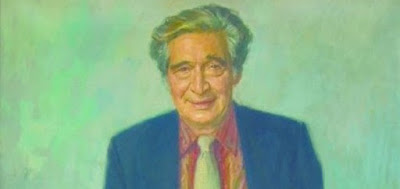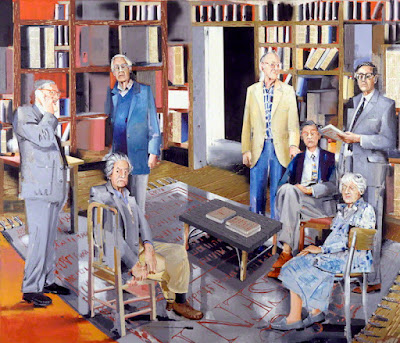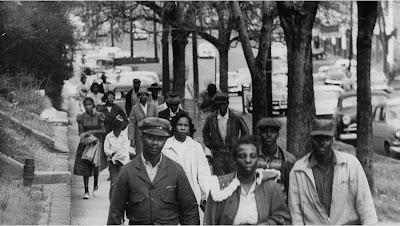MI Finley (1912-1986) played a transformative role in the development of studies of the ancient world in the 1960s through the 1980s. He contributed to a reorientation of the field away from purely textual and philological sources to broad application of contemporary social science frameworks to the ancient world. His book The Ancient Economy (1973) was especially influential.
Finley was born in the United States, but most of his academic career unfolded in Britain. The reasons for this "brain drain" are peculiarly America. Like many other Americans -- screenwriters, actors, directors, government officials, and academics -- Finley became enmeshed in the period of unhinged political repression known as McCarthyism. Finley was named as a member of the Communist Party of the United States by fellow academic Karl Wittfogel in his own sworn testimony to the McCarran Committee (United States Senate Subcommittee on Internal Security). (Pat McCarran (D-NEV) was also the primary sponsor of the Subversive Activities Control Act (1950), which provided for mandatory registration of members of the Communist Party and created the legal possibility of "emergency detention" of Communists. Police state institutions!) When Finley was called to testify under oath to the committee, he declined to answer any questions based on his Fifth Amendment rights against self-incrimination. He was subsequently fired by Rutgers University for his refusal to answer the committee's questions. (Daniel Tompkins' essay "Moses Finkelstein and the American Scene: The Political Formation of Moses Finley, 1932-1955" provides some valuable information about the first half of Finley's career until he departed the United States; link.)
It should be noted that one's Fifth Amendment rights do not allow the witness to pick and choose which questions he or she is willing to answer. Many of the witnesses who took the Fifth during this period were fully willing to discuss their own activities but were not willing to name associates -- for example, Case Western Reserve professor Marcus Singer. Here is a brief summary of Singer's case taken from his New York Times obituary (October 11, 1994).
In 1953, when he was on the Cornell University faculty, Dr. Singer was called before the House Un-American Activities Committee and questioned about his political affiliations. He admitted having been a Communist until 1948, although he said he had never held a party card. He refused to name Communists he had known while teaching at Harvard, from 1942 to 1951, on grounds of "honor and conscience" and invoked the protection of the Fifth Amendment.
In 1956, he was convicted of contempt of Congress, fined $100 and given a three-month suspended sentence in Federal District Court in Washington, which ruled that he had waived the Fifth Amendment's protection. In 1957 the United States Court of Appeals for the District of Columbia Circuit set aside the conviction, saying its ruling was required by a Supreme Court decision in a similar case. The court sent the case back to Federal District Court with instructions to enter a judgment of not guilty.
In hindsight the willing participation of university presidents, law professors, and other faculty in the effort to exclude Communists or former Communists from faculty positions, and to fire professors who chose to plead the fifth amendment rather than provide testimony to the various congressional committees about their associates seems to reflect an almost incredible level of hysteria and paranoia. Ellen Schrecker documents the compliant actions of many administrators, trustees, and fellow faculty members (link). This was a betrayal of the principles of academic and personal freedom. One does not need to be an advocate of the Communist Party in order to defend a strong principle of academic freedom for all professors; and yet administrators and faculty at many leading universities were eager to find ways of supporting these anti-Communist measures. Schrecker quotes an official statement of the AAU in 1953 that provided grounds for firing faculty for membership in the Communist Party and for refusal to testify about their activities (link):
The professor owes his colleagues in the university complete candor and perfect integrity, precluding any kind of clandestine or conspiratorial activities. He owes equal candor to the public. If he is called upon to answer for his convictions, it is his duty as a citizen to speak out. It is even more his duty as a professor. Refusal to do so, on whatever legal grounds, cannot fail to reflect upon a profession that claims for itself the fullest freedom to speak and the maximum protection of that freedom available in our society. In this respect, invocation of the Fifth Amendment places upon a professor a heavy burden of proof of his fitness to hold a teaching position and lays upon his university an obligation to reexamine his qualifications for membership in its society. (325)
The AAUP eventually issued a statement condemning firing of professors for these reasons in 1956; but the damage was done.
But what about MI Finley? Was he a member of the CP-USA? And did this membership influence his thinking, teaching, and writing? Was he unsuitable to serve as a professor at an American university? F.S. Naiden answers the first question unequivocally: "Incontrovertible evidence now shows that Moses Finkelstein, as he was then named, joined the Party in 1937–8. The Party official who enrolled him, Emily Randolph Grace, reported this information in a biographical note she wrote about Finley in order to prepare for an international conference in 1960" (link). And Naiden suggests that his membership continued through the mid-1940s.
Let's take Naiden's assessment as accurate; so what? Should Finley's membership in the 1930s be viewed as basis for disqualification as a professor fifteen years later? Here the answer seems clear: Finley's choices in the 1930s reflected his political and social convictions, his ideas and thoughts, and should fairly be seen as falling within his rights of freedom of thought, speech, and association. If his political ideas led him to commit substantive violations of the law, of course it would be legitimate to charge him under the relevant law; but there is no suggestion that this was the case. So Finley's persecution in 1953 -- along with the dozens of other faculty members who were fired from US universities for the same reason -- is just that: persecution based on his thoughts and convictions.
And what about his teaching? Did his previous membership in the Communist Party interfere with his professional responsibilities to his students or to the academic standards of his discipline? Again, the answer appears to be unequivocal. Finley, like the great majority of other professors dismissed for their Communist beliefs, appeared to make a strong separation between his personal political beliefs and the content of his teaching. He did not use the classroom to indoctrinate his students. And his activism in the 1930s -- organizing, leafletting, efforts to persuade others -- was clearly separated from his academic performance. (He had not even completed his PhD during the prime years of his membership in the Communist Party.) So any unbiased observer from Mars would judge that Finley was a fully ethical academic.
Finally, what about his research and writing? Did his membership in the Communist Party distort his scholarship? Did it interfere with his ethical standards of honesty and evidence-based historical research? Again, by the evidence of his writing, this charge too seems wholly unsupportable. Finley was a superb scholar, and his research is grounded in a reasonable and extensive marshaling of evidence about the social and economic realities of the ancient world. Finley was not a communist hack; he was not a dogmatic ideologue; rather, he was a dedicated and evidence-driven scholar -- with innovative theoretical and methodological ideas.
It is especially interesting to read Finley's short essay on the trial of Socrates in the context of his political persecution in the United States in 1953 (Socrates on Trial, first published in slightly different form in Aspects of Antiquity in 1960). Though there is an obvious parallel between the trial of Socrates and the encounter between Finley and the United States Senate Subcommittee on Internal Security -- in each case the accused is brought to legal process based on his thoughts and criticisms of the society in which he lives -- there is no indication in this text that Finley wishes to draw out this comparison. Instead, most of his essay focuses on the point that much of the trial of Socrates has been mythologized for political purposes -- to attack direct democracy and the tyranny of the majority. Plato's text is a work of literature, not a transcription of the details of the accusations and the responses of Socrates.
Paradoxically, it is not what Socrates said that is so momentous, but what Meletus and Anytus and Lycon said, what they thought, and what they feared. Who were these men to initiate so vital an action? Unfortunately, little is known about Meletus and Lycon, but Anytus was a prominent patriot and statesman. His participation indicates that the prosecution was carefully thought through, not merely a frivolous or petty persecution.
And Finley attempts to understand the thinking of the jurors themselves by placing the trial in the context of the massive Athenian trauma of the Peloponnesian War and two devastating plagues:
One noteworthy fact in their lives was Athens had been engaged in a bloody war with Sparta, the Peloponnesian War, which began in 431 B.C. and did not end (though it was interrupted by periods of uneasy peace) until 404, five years before the trial. The greatest power in the Greek world, Athens led an exceptional empire, prosperous, and proud -- proud of its position, of its culture, and, above all, of its democratic system. But by 404 everything was gone: the empire, the glory, and the democracy. In their place stood a Spartan garrison and a dictatorship (which came to be known as the Thirty Tyrants). The psychological blow was incalculable, and there was not a man on the jury in 399 who could have forgotten it.
So Finley offers a historically dispassionate reading of the trial of Socrates. But we might draw out the essential parallel between the two cases anyway. We might say that Finley, like Socrates, was attacked because he "denied the gods of the city" -- in Finley's case, he challenged the unquestioned moral superiority of capitalism over socialism; and because he threatened to "corrupt the youth" -- to teach through his classroom and his example an unwholesome inclination to "communism". Might we say that the "crimes" of Socrates and Finley were similar after all, in the minds of their persecutors: they were too independent-minded and too critical of their society for the good of society?
I.F. Stone's Trial of Socrates offers a fascinating perspective on Socrates that is relevant to these connections to Finley; and in fact, Stone suggested to Finley that he should write a memoir of his experience (Tompkins (link) p. 5). In Trial of Socrates he writes: "Was the condemnation of Socrates a unique case? Or was he only the most famous victim in a wave of persecutions aimed at irreligious philosophers? ... Two distinguished scholars ... have put forward the view that fifth-century Athens, though often called the Age of the Greek Enlightenment, was also ... the scene of a general witch-hunt against freethinkers." The same words could apply to MI Finley and the dozens of other faculty members who lost their careers to McCarthyism, and to the regrettable failure of liberal democracy in those decades of ideological warfare against critics of capitalism.







